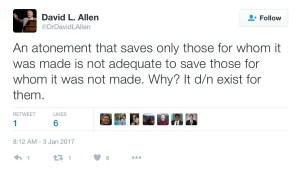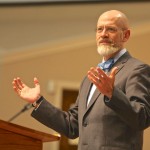 Dr. Sam Storms: Article – The Vine, the Branches and Christian Perseverance (original source here)
Dr. Sam Storms: Article – The Vine, the Branches and Christian Perseverance (original source here)
A lot of people struggle with John 15:1-11 and our Lord’s teaching on the vine and the branches. This week I’ve been looking at the question of the relationship between professed faith in Christ and consistent obedience to his commands. This passage speaks directly to the issue. Let’s look closely at it.
“I am the true vine, and my Father is the vinedresser. Every branch in me that does not bear fruit he takes away, and every branch that does bear fruit he prunes, that it may bear more fruit. Already you are clean because of the word that I have spoken to you. Abide in me, and I in you. As the branch cannot bear fruit by itself, unless it abides in the vine, neither can you, unless you abide in me. I am the vine; you are the branches. Whoever abides in me and I in him, he it is that bears much fruit, for apart from me you can do nothing. If anyone does not abide in me he is thrown away like a branch and withers; and the branches are gathered, thrown into the fire, and burned. If you abide in me, and my words abide in you, ask whatever you wish, and it will be done for you. By this my Father is glorified, that you bear much fruit and so prove to be my disciples. As the Father has loved me, so have I loved you. Abide in my love. If you keep my commandments, you will abide in my love, just as I have kept my Father’s commandments and abide in his love. These things I have spoken to you, that my joy may be in you, and that your joy may be full.” (John 15:1-11)
Here we read that God, as the Vinedresser, lovingly “prunes” believers (v. 2), i.e., cleanses, purges, and purifies them of whatever does not contribute to their spiritual maturity (or fruitfulness). This might occur in any number of ways: discipline, teaching, testing, etc. The debate centers on what God does with the fruitless branches, and what the latter represent. There have generally been three views of this passage.
One popular view is that the “fruitless branches” are genuine Christians who, because of their fruitlessness, or because of their failure to persevere in holiness of life, lose their salvation. When Jesus says these branches will be “thrown into the fire, and burned” (v. 6b), he is referring to eternal punishment in hell. Continue reading


